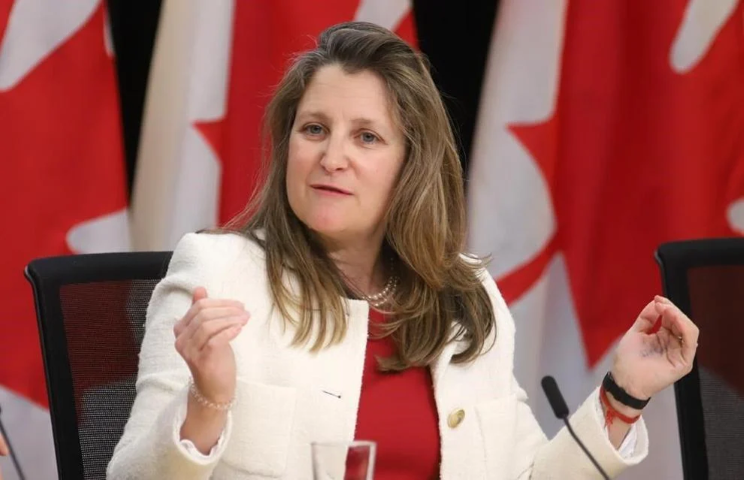
Finance Minister Chrystia Freeland participates in a news conference to announce a new youth mental health fund at the National Press Theatre in Ottawa on Tuesday, April 9, 2024. THE CANADIAN PRESS/ Patrick Doyle
Finance Minister Chrystia Freeland has clarified that there won't be tax increases for the middle class in the upcoming federal budget. However, she hasn't disclosed whether corporations or wealthy individuals will face tax hikes. During a recent press conference, Freeland evaded questions regarding potential new taxes on corporate Canada or other affluent segments of society.
Instead, she emphasized the pressing need to invest in critical areas such as housing and artificial intelligence, particularly for the benefit of young Canadians. Freeland stressed the importance of making these investments responsibly, maintaining fiscal prudence.
Freeland has reaffirmed her commitment to adhering to the fiscal guidelines established in the fall, which include keeping the federal deficit below $40.1 billion. Despite this commitment, she maintains that any new measures will not involve raising taxes on the middle class, asserting the government's dedication to supporting hardworking middle-income Canadians.
Prime Minister Justin Trudeau has echoed similar assurances regarding tax policies impacting the middle class. With the federal budget scheduled for release on April 16, there is growing speculation about how the Liberal government intends to finance recent policy proposals, such as a national school food program.
The government is under pressure to balance its spending to avoid exacerbating inflation or hindering the Bank of Canada's ability to adjust interest rates. Additionally, a sluggish economy has constrained government revenues, limiting resources available for new initiatives.
Given these fiscal challenges, some progressive voices have advocated for leveraging taxation to generate additional revenue. The New Democratic Party (NDP) has proposed reversing corporate tax cuts implemented during the Harper administration to fund new policy initiatives. These cuts reduced the corporate tax rate from 22 percent to 15 percent.
Furthermore, the House of Commons finance committee has recommended imposing a windfall tax on companies across various sectors that have experienced disproportionately high profits during crises. This tax revenue would be directed towards doubling the Goods and Services Tax (GST) rebate. However, Conservative members of the committee did not endorse these pre-budget recommendations.
There's also been discussion about implementing an "excess profits" tax on Canadian grocery chains, particularly following consumer concerns about rising grocery prices during the pandemic. Prime Minister Trudeau has previously hinted at using tax measures to hold grocers accountable if they fail to cooperate with efforts to address food inflation. The government has expressed disappointment with the grocery industry's efforts to stabilize prices.
Amidst these discussions, the Trudeau government has embarked on a nationwide tour over the past two weeks, announcing various measures expected to be included in the federal budget. Unlike traditional budget releases, where details are typically kept under wraps until the day of presentation, the government has opted for a more transparent approach this time. Freeland explained that this strategy allows Canadians to understand the government's initiatives and engage in informed debates about proposed measures.
Overall, the debate surrounding taxation and budgetary measures underscores the complexities of balancing fiscal responsibility with addressing pressing societal needs in Canada. The forthcoming budget will provide further insights into the government's priorities and strategies for navigating these challenges.















